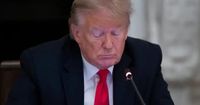In a surprising turn of events, the U.S. Customs and Border Protection agency quietly announced on Saturday that a specific commodity code, which corresponds to smartphones, will be exempt from the recently imposed 125% tariffs on goods entering the country from China. This development, analyzed by the BBC, indicates that smartphones, a crucial export from China to the U.S., will not be subjected to these tariffs, raising questions about the implications for major tech companies like Apple.
Previously, U.S. Commerce Secretary Howard Luthnick had indicated that the escalation of tariffs aimed to encourage the return of iPhone production to the United States. This recent exemption marks a significant reversal, as it allows the most prominent Chinese export to the U.S. to avoid the financial burden of tariffs, which could have resulted in dramatic price increases for consumers.
According to market research firm Counterpoint, approximately 80% of Apple’s iPhones sold in the U.S. are manufactured in China. With production costs estimated to account for 40-60% of the retail price, typical iPhone prices could have soared to around $2,000 had the tariffs remained in place. The exemption has effectively averted a potential crisis for Apple, although the White House has warned that existing 20% tariffs linked to fentanyl issues may still apply.
Tim Cook, Apple’s CEO, plays a pivotal role in these developments and is expected to be involved in discussions with both U.S. President Donald Trump and Chinese President Xi Jinping. According to the BBC, Cook could significantly influence negotiations between the two nations, potentially steering outcomes that favor both American interests and Apple’s operations.
As the situation unfolds, reports suggest that U.S. trade hawk Peter Navarro is being sidelined in favor of Treasury Secretary Scott Bessent, who is now leading negotiations with trade partners to avoid the reimposition of tariffs after a 90-day pause. This shift raises questions about the motivations of other nations to offer concessions to the U.S., especially in light of the administration's apparent concern over market reactions to its trade plans.
Capital Economics has pointed out that only a quarter of China’s total exports are currently exempt from the 125% tariff. This exemption list also benefits other countries significantly, with 64% of exports to the U.S. from Taiwan, 44% from Malaysia, and nearly 30% from Vietnam and Thailand now exempt.
In a broader context, the implications of these tariff policies extend beyond tech giants like Apple. The imposition of additional tariffs on food exports, particularly Greek products such as feta cheese, peaches, and olives, is expected to have severe consequences. The announcement of these tariffs has sent shockwaves through the global economy, with estimates suggesting that Greece could see a 0.5% reduction in GDP, translating to approximately 1.1 billion euros.
In 2024, Greek exports to the U.S. totaled 2.4 billion euros, accounting for 4.8% of total exports and contributing about 1% of Greece’s GDP. The most significant Greek exports to the U.S. include petroleum products, fruits, vegetables, and aluminum, with petroleum products alone comprising 23% of the total exports.
Despite the potential for increased tariffs, the demand for petroleum products is expected to remain stable, as the U.S. aims to bolster domestic industrial production. However, food exporters are bracing for the worst, particularly for products like feta cheese, which may face price hikes due to tariffs. In 2024, the value of feta exports to the U.S. reached 53.6 million euros, while Greek wine exports were valued at 19 million euros.
Concerns are also mounting regarding the potential secondary effects of these tariffs on tourism. If European countries experience income losses due to tariffs, it could adversely impact Greek tourism, a crucial sector for the economy. Furthermore, with the U.S. imposing tariffs on China, there is a risk that China may redirect its focus to other markets, potentially affecting Greek exports.
Greek olives have established a strong presence in the U.S. market, with exports valued at 241 million euros in 2024, marking a 39% increase from the previous year. The country also exported 45,000 tons of olive oil to the U.S. in 2024, according to the Association of Greek Industries of Olive Oil.
The lingering uncertainty surrounding these tariff policies has led many economists to predict a period of stagflation, particularly for Greece, which is starting from a weaker economic base. The Bank of Greece has revised its inflation forecast for this year to 2.9%, up from an earlier estimate of 2.5%, indicating that prices may rise higher than initially anticipated.
While the immediate impact on the Greek economy may not be severe, experts stress the importance of maintaining fiscal discipline. Achieving strong primary surpluses is critical to ensuring that Greece can continue to borrow from markets without exacerbating its financial situation. The increased uncertainty is expected to drive up yields on bonds and stocks, as evidenced by the initial market reactions following the announcement of the tariffs.
As the U.S. tariff policy unfolds, it is anticipated that the value of the dollar will weaken, with the dollar dropping over 2% against the euro on the first day of tariff implementation. This depreciation will make U.S. imports cheaper, particularly oil, while strengthening the euro could make exports from Eurozone countries, including Greece, more expensive for global markets.
In response to these challenges, the Greek government is focusing on strengthening the European Union’s trade union to bolster domestic production and enhance the continent's self-sufficiency. The Economic Policy Council, led by Deputy Prime Minister Kostis Hatzidakis, has outlined seven strategic interventions aimed at shielding the economy from international instability, including attracting more investment, enhancing financing for the real economy, and improving infrastructure.
As stakeholders await clearer signals about the future of the global economic landscape, the next six to nine months will be crucial for determining the trajectory of trade relations and economic stability.






